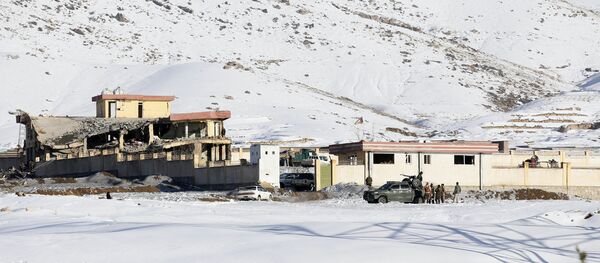On 28 February 2019, the Ministry of Telecommunications and Information Technologies (MCIT) struck a deal with Josh Bustos, the head of Bustos Group LLC, to implement a Real Data Time Management project to ensure the transparency of collecting taxes on telecommunications services.
The contract was signed in the presence of Afghan President Ashraf Ghani.
The problem is that "Bustos [Group LLC] received a license only a day after signing the contract", Abdul Rezak Wahidi, ex-minister of communications and information technology of Afghanistan, told Sputnik Afghanistan.
Judging from the company's registration data, Bustos Group LLC was put on record on 1 March 2019 in Nevada, the United States, with a zero capital amount. According to the Google cache, Joshua Bustos placed the order for the development of the logo for his company on 28 February 2019 on the 99designs website.
Previously, Josh Bustos worked for Safi Airways, a national airline that ceased operations in Afghanistan due to default on debt in 2016. Having married an Afghan woman the same year, he converted to Islam.
The controversial contract stirred a heated debate in the Afghan media and social networks, which apparently prompted Bustos Group LLC to shut down its website.
Still, Wahidi elaborated that the company's website "consisted of one page" which was most likely "made in haste". The ex-minister opined that the quality of the website obviously cast a shadow on the company's reputation and its ability to implement sophisticated telecom projects.
The former official recalled that earlier, the Afghan National Procurement Commission (NPC) had considered an agreement for a Real Data Time Management project with two US companies — Latro and Bustos.
"These companies were required to submit documents within 28 days", he explained. "In order to increase transparency and accountability during the contract implementation and provide technical assistance and control to these companies, a project has been developed to create an independent monitoring committee consisting of observers from Integrity Watch Afghanistan, the Commission on Access to Information, the Association of IT Companies and the Office of Statistics and Information of the National Procurement Commission".
However, according to Wahidi, it was a mere manoeuvre by the ministry to hide the shameful truth: "There is information that Latro previously participated in the tender, but did not meet the conditions. In addition, there is a certain conflict of interest with regard to activities of both companies", the former Afghan official noted.
"Instead of giving $11 million to an unknown company, give $2 million to Afghan professionals and young people who will create the best Real Time system", he said.
For his part, MCIT spokesperson Saeed Zaland refuted the assumption that the project's cost had been inflated, stressing that it had initially cost $18 million.
"The necessity of creating the system of Real Time Data Management is provided for by the law on the provision of telecommunications products", Zaland told Sputnik. "To this end, a joint committee was created by the Ministry of Telecommunications, the Ministry of Economy, the Ministry of Finance, and the Afghanistan Telecom Regulatory Authority (ATRA) for a technical and financial assessment of the project".
According to Zaland, "to implement the decision taken at the meeting of the National Procurement Commission, an interdepartmental committee was organized to study the technical and financial condition of the company".
"The committee was obliged to carefully examine all the technical aspects of the transaction with the proposed companies and make sure that the company has all the technical capabilities to implement this project. After submitting the report to the interdepartmental commission and approving the project's cost, the National Procurement Committee and the company concluded an agreement", the ministry spokesman concluded.
The views and opinions expressed by the speakers do not necessarily reflect those of Sputnik.





